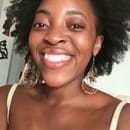English. The remnant of a distant, ancestral generation’s loss. The quaint pinch of imperialism plucked from the words I speak so fluently. The sting of improper inflation in my tone or the fixed mispronunciation of a word to remind me that my blood once soaked in the dialect of the other. The unnamed and displaced, with tongues shaped like my own, skin adorned as my own, and hair of mounted black cotton like my own. There once existed a language to cement their existence, language now lost to me, two generations removed. I still struggle with this sense of duplicity, of being an imposter. The feeling oozes and drips from my bloodline. A coup d’état.
When my grandparents were politically exiled from South Africa during the height of apartheid they left with the understanding that they would never see their country again. Leaving the land which birthed, fed, and bathed the family tree of my ancestors can never be described as a choice. The need to survive left my mother and her family departed from the world they once held. I’d like to think the moment they left the land cried out in a deafening sorrow, that the world raptured two times over and that the sky molted with hail for forty days and forty nights. I need to believe that South Africa and all the lives within her performed the same sacrifice as my grandparents that day, felt the same loss. Because once the Atlantic ceased to split her tides, once the plains and rivers had sung their last swan song, and the family home I would never know had been immortalized, my grandparents smothered the heartbeat of their mother-country. Unable or perhaps unwilling to bear the hymns of a decaying memory, they locked South Africa in dreams of the night and with her forever lost is the language of our people, Xhosa.
As a child, I asked the world to lay in my garden. To reduce all that I could never know into something I could understand, something I could feel, and be a part of. The world refused. I tried to hate my mother for not knowing the tongue of her own mother and when that failed I tried to hate my grandparents for the powerlessness of veiled tomorrows. They could never have known that they would once again be one with their country, that they would feel the soil of South Africa spill around their feet and welcome them home. If they had, they would have taught their children I’m sure of it. And my mother would have taught me; how to fall in love in Xhosa, how to dream in Xhosa, how to be Xhosa. Because I wasn’t, not if I didn’t speak the language. And I don’t; I probably never will. I know bomami means my mother, I know ilanga means the sun, and I know Zanele means to be enough. But that is all of Xhosa that lives on my tongue.
I once felt the world purely through language. It held ties to everything meaningful and without it, I was lost. I thought that connecting with people was something to be taught, and that feelings were things that could be learned and expressed eloquently in the most beautiful and alluring forms. I thought I needed to understand the words of my people to know the meaning of myself. I looked at language as the divider between those with ropes to the past that carried the promise of deeper awakenings of identity and definition and those detached, lost, and integrated into a society of the unclaimed. I could not have been more wrong.
Language is not monolithic. Language in its simplest form is an idea or even better, the expression of an idea. It is constantly evolving, shifting, and molding to the tongues of the people speaking. But most importantly, language is never complete on its own. It is the person behind it, who declares its meaning. Meaning that beyond language, it is truly people, something magical and uniquely human about a person, that draws the connections and creates the worlds. I don’t need language to be a Xhosa woman. I don’t need language to feel what my grandmother felt the day she left South Africa, I don’t need language to taste the wounds of enslavement marked in my father’s bloodline. I don’t need language to hear the tremors of rage and defiance buried deep in the voices of survivors.
We are not our language. We are a collage of memories, of grief and continuance, of joy and spent time, of skin and scars, of lies and undiscovered truths, we are so many things unexpressed through language but through existence. The same way I can listen to “Cucurrucucu Paloma” by Caetano Veloso and watch the sky exhale as he sings about a dying love, language can’t explain why I see my body raised and descending with the movement of waves transferring me, the sea wrapping itself around me, and I learning again how to breathe underwater when I close my eyes and hear this song. I close my eyes again and All I can feel is breathlessness, pockets of air shredding cement, waves sinking, two heartbeats repenting, and I learning how to split the surface with not enough skin left for fear. Its moments I see, visions that sometimes never happen in reality, but it’s what connects me to the music regardless of language barriers.
When I asked my close friend and fellow monolingual, Janay Ferguson, what she feels when she listens to “Safari” sung in Spanish by J Balvin, she found it difficult to string the words together into a single coherent idea.
Janay understands, like many of us, that emotions are not easily explained, “I just think it’s sexy, it makes me want to move my body” she said, “Music is a universal language. It isn’t just the lyrics or what people are saying but the vibe through the melody and the beat”.
We all have that song that makes you feel so free, so happy that you can’t help yourself from dancing or whining your waist as Janay does. It’s a feeling of liberation, the intentional disregard of perception, and the allowance to just let your body move. For me, that song is “Ojuelegba” by Wizkid. Sung in Yoruba, I have no idea what Wizkid is literally saying as I listen to him sing just as Janay couldn’t know what J Balvin is singing and yet we understand.
Emotions cannot be owned or localized to specific cultures or communities just as music cannot be. When I hear Ojuelegba there is no construction of movement, everything just is. I am connected to elements of myself that don’t present themselves outwardly. And that song specifically helps heal an aching dissonance living within me between the North American continent and Africa. The sway of my hips, the way I shake my butt and throw my hands in the air; those are feelings too. An “energy”, as Janay describes.
I had a similar conversation with Dhriti Gupta, another close friend. Although she speaks English and Hindi, one of her favourite songs is “Suis-Moi”, a French cover sung by Cyrille Aimée and Nataly Dawn. “It just makes me feel really sunny and happy and it evokes very specific imagery for me,” she said.
These images and memories that “Suis-Moi” reflects will never fully be contained in the explanation of happiness. It’s so much more than that for Dhriti, “you don’t need to understand the language to feel a song” she adds. And I would go further to argue that you don’t need language at all to recognize a feeling, its an emotional journey connected through shared humanity. Dhriti gives the example of Han Zimmer to further illustrate this point, “If you think about soundtracks…Han Zimmer, his works are really emotional and people really feel them…he is like greatly recognized for evoking emotions in people but most of his music is just instrumental and there [are] no words”.
Brennan March, a creative industries major, said one of his favorite songs is “La Javanaise” covered by Madeleine Peyroux. After hearing it in his favourite movie, The Shape of Water, he felt it was a “second language” to him.
“I don’t speak the language but I know that they’re singing about something beautiful”, Brennan noted as he described the way the song continues to translate to his own life despite not fully understanding the lyrics. “It’s not inherently spoken, but I think that it’s implied to be about love…you don’t know what it is or where it’s headed you just know that it’s something that feels better than anything else and you experience that” through the song.
I went on to ask Brennan if not being able to know what Peyroux was saying changed anything for him, made it more difficult to stay connected to the song, but the language barrier seemed to less of a burden and more of just another aspect of experiencing music to Brennan.
“WhenI listen to music I feel like lyrics are just a secondary part” Brennan reflects. “I think the most important thing about a song is how it makes you feel regardless. Some of my favorite songs, the lyrics mean the exact opposite of what the song is supposed to make you feel but at the end of the day, it’s not the lyrics that are going to make you feel something”.
Beyond music, human connection is more about the feeling than anything else. Untouched by society, it is innately human and something that exists beyond the bounds of “time and space.” Brennan and I ended our conversation with the lasting idea that “you can still be close to someone [despite not speaking] their language. You’re connected to them through something deeper than that. And…you necessarily need words to describe that”.
I still dream of a life where I can speak to my grandmother and my grandfather in their native language. A world where I don’t associate English with chaos and language with borders. It isn’t easy to unlearn a definition connotated with feelings of insufficiency. Every day is a journey to reclaim the language I use toward myself, the language I associate with my ancestors, the language I allow to shape and constrict the world. We are so much more than what we can ever say. And our connections to each other run deeper than words can tell.


